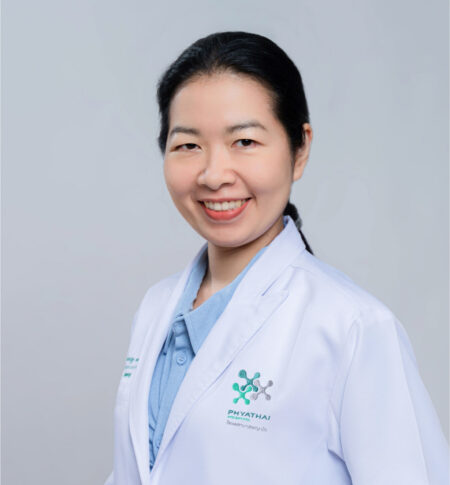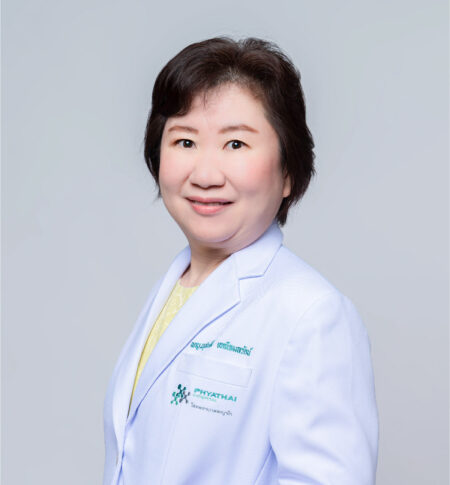Dr. Dabuswinee also mentioned the various diseases they frequently encounter and treat in children.
“Currently, the diseases I often treat fall under the category of endocrine disorders, which involve treating abnormalities in hormones present in the body, such as thyroid hormones and diabetes. Additionally, I frequently encounter cases related to growth and developmental disorders, such as precocious puberty, abnormally tall or short stature, and obesity.”
When asked about the importance of seeking medical attention for children experiencing precocious puberty, Dr. Dabuswinee emphasized the significance of parental awareness.
“In modern times, many parents have a good understanding of child development and keep themselves well-informed. They may notice and suspect certain abnormalities in their children on their own. When they notice such signs, it is essential to consult a medical professional. Nowadays, information about child development is readily available online, or sometimes parents may discuss their concerns with friends who have children of similar ages. If they observe any worrisome symptoms, they often bring their children for a check-up. While some children may not have any abnormalities, it is always better to have them examined. If any issues are identified early, treatment can yield better results.”
Dr. Dabuswinee concluded by expressing their dedication to providing the best possible care for children.
“As a pediatrician, my passion for working with children has only grown stronger over time. It brings me immense joy to be able to contribute to the well-being of children and witness their healthy growth and development.”
In child development and growth, Dr. Dabuswinee always observes when children come for vaccinations. She checks to see if the children’s height is within the norm and if there are any endocrine disorders, such as abnormal thyroid hormones leading to delayed growth or early puberty, like a sudden increase in height in children. For girls, breast development might start at a very young age, even before eight years old. Additionally, obesity can be detected by looking at a child’s weight exceeding the norm. Dr. Dabuswinee can assess all these factors from the time the child comes for vaccination at the hospital.
“Normally, as a general pediatrician, I can treat children from birth up to 15 years of age. However, as a specialist in this field, I continue to monitor their growth until they reach 18 years of age. Regarding endocrine disorders or abnormalities related to growth, there are significant differences between each condition. For conditions related to early growth, we administer hormone injections to ensure the child’s height follows the norm based on genetics and their menstrual cycle for girls. For diabetes, it depends on the type. For type 1, insulin injections are required, while for type 2, which is linked to obesity, oral medication is prescribed. As for thyroid diseases, medication is the main treatment, but some conditions might require lifelong management. For cases that require surgical intervention, we refer them to pediatric surgeons for further care.”
“When patients enter puberty, they often worry about their appearance, such as height, body shape, or weight. When children recognize the importance of these aspects, they become more cooperative in their treatment because they wish to have good health and look good. For example, in cases of obesity and diabetes, children will cooperate to control their weight, follow proper eating habits, and adhere to the doctor’s advice. Adolescents who are concerned about their height, fearing they won’t grow tall enough, will receive guidance on nutrition and proper self-care in terms of both health and development. We encourage their cooperation and compliance. In our department, we have the Harpenden Stadiometer, a standardized measuring instrument used exclusively in the endocrine clinic to precisely measure height. Besides, our laboratory can conduct comprehensive blood tests and hormone assessments.”
Dr. Dabuswinee always keeps herself updated with new research and knowledge. With a strong commitment, she aims to ensure that patients do not miss any opportunities for treatment and receive the best possible care. She cares deeply for her patients and wants to provide them with the utmost care. Moreover, she encourages patients, especially teenagers, to be involved in treatment decisions. For teenage patients, she typically explains and provides complete information to ensure they receive the best and most suitable treatment according to the parents’ intentions when they bring their children for consultation. In this regard, she advises parents as follows:
“Regarding the condition of adolescence, I would like to advise you to carefully observe your children and look for appropriate growth. In the case of girls, they should not develop breasts before the age of eight. Mothers can observe this by looking and touching. Some children, both boys and girls, may experience rapid and abnormal growth, which might seem like a good thing to some parents, thinking that their children are growing tall and fast. However, in reality, this could be a sign of early adolescence for boys and girls, and it may not be a good thing for girls to have their periods before the right age. I want to leave this advice here for those who seek further information. You can always call and inquire with the hospital staff at any time.”












